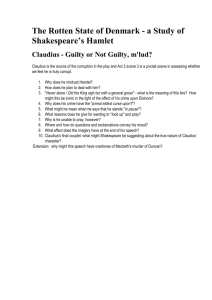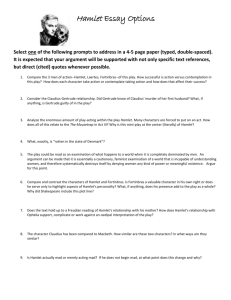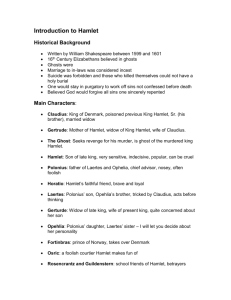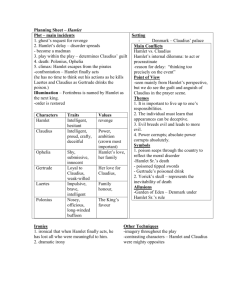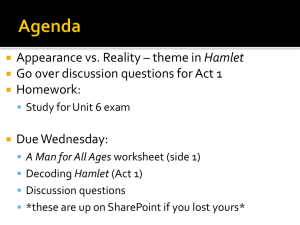Act 1 Scenes 2-4 Discussion Questions and Answers
advertisement
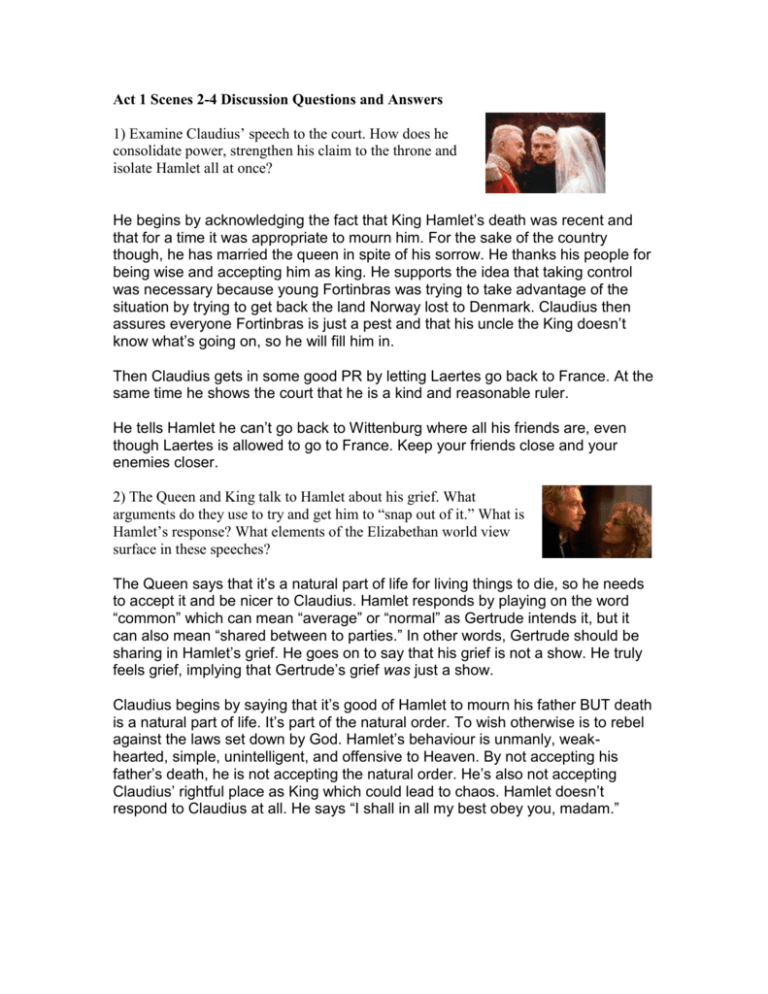
Act 1 Scenes 2-4 Discussion Questions and Answers 1) Examine Claudius’ speech to the court. How does he consolidate power, strengthen his claim to the throne and isolate Hamlet all at once? He begins by acknowledging the fact that King Hamlet’s death was recent and that for a time it was appropriate to mourn him. For the sake of the country though, he has married the queen in spite of his sorrow. He thanks his people for being wise and accepting him as king. He supports the idea that taking control was necessary because young Fortinbras was trying to take advantage of the situation by trying to get back the land Norway lost to Denmark. Claudius then assures everyone Fortinbras is just a pest and that his uncle the King doesn’t know what’s going on, so he will fill him in. Then Claudius gets in some good PR by letting Laertes go back to France. At the same time he shows the court that he is a kind and reasonable ruler. He tells Hamlet he can’t go back to Wittenburg where all his friends are, even though Laertes is allowed to go to France. Keep your friends close and your enemies closer. 2) The Queen and King talk to Hamlet about his grief. What arguments do they use to try and get him to “snap out of it.” What is Hamlet’s response? What elements of the Elizabethan world view surface in these speeches? The Queen says that it’s a natural part of life for living things to die, so he needs to accept it and be nicer to Claudius. Hamlet responds by playing on the word “common” which can mean “average” or “normal” as Gertrude intends it, but it can also mean “shared between to parties.” In other words, Gertrude should be sharing in Hamlet’s grief. He goes on to say that his grief is not a show. He truly feels grief, implying that Gertrude’s grief was just a show. Claudius begins by saying that it’s good of Hamlet to mourn his father BUT death is a natural part of life. It’s part of the natural order. To wish otherwise is to rebel against the laws set down by God. Hamlet’s behaviour is unmanly, weakhearted, simple, unintelligent, and offensive to Heaven. By not accepting his father’s death, he is not accepting the natural order. He’s also not accepting Claudius’ rightful place as King which could lead to chaos. Hamlet doesn’t respond to Claudius at all. He says “I shall in all my best obey you, madam.” 3) What does Hamlet’s first soliloquy reveal about himself, his situation at court, and his relationship with his mother? Hamlet is depressed. He doesn’t so much want to commit suicide as he wishes he could just be dead or cease to exist. Life seems pointless to him and everything in the world tends toward corruption. He’s furious with his mother for marrying Claudius not just because it’s so soon but because he thinks Claudius is like an animal when compared to the old Hamlet’s greatness. He doesn’t think it’s possible that his mother could have loved his father so much if she’s now able to transfer that love to Claudius. He feels betrayed. He thinks her mourning was all an act. 4. Laertes gives advice to Ophelia. What is the main thrust of his concern? Don’t have sex with Hamlet. He’s just toying with you. He’ll change his mind. Polonius gives advice to Laertes: summarize that advice. What does the speech tell us about Polonius? Polonius is a windbag and a hypocrite. He loves to hear himself talk. First he chides Laertes for not being gone yet and then he makes him stay for a long speech where he tells Laertes how not to embarrass him overseas. His advice seems to be solid, but it’s more about how not to appear to be a bad person rather than how to be a good person. Describe the conversation between Polonius and Ophelia—what is Polonius’ main concern? Polonius sounds very condescending. He tells Ophelia that she’s naïve and stupid and that he’ll tell her what to think, mainly because he doesn’t want her to make him look bad “tender yourself more dearly…/Or/…you’ll tender me a fool” (I iii109-110) 5) Before Hamlet sees the ghost, he talks to Horatio about the court at Elsinore—what is his main concern? Claudius likes to get drunk and make a fool out of himself. He says the Danes have a reputation for this abroad and he doesn’t like the fact that Claudius is proving this to be true. It reflects badly on Hamlet. Hamlet wonders about the nature of the ghost, as does Horatio. Summarize those concerns. Are these valid given your understanding of Elizabethan metaphysics. He isn’t sure whether the ghost is sent from Heaven or Hell. It’s going against the natural order which is a signal that something is wrong in the world. Horatio is worried it is there to tempt him to kill himself. These are valid concerns because the natural order has been disturbed and because Elizabethans believed the devil actively tempted people to sin.
